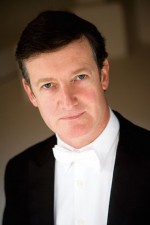Title
When the English Concert launched its master class program in London in 2010, its workshops focused on training a select group of up-and-coming harpsichordist-directors. Spearheading this innovative program was Harry Bicket, the renowned conductor who has headed the early-music ensemble since 2007. The success of the London program has inspired the creation of an initiative in the United States—The English Concert in America (TECA)—with a similar educational thrust but a more expansive reach. The first group of fellows—violinists Adriane Post and Jude Ziliak, harpsichordist Ignacio Prego, and cellist Beiliang Zhu, all of them recent Juilliard Historical Performance grads—was tapped in April.
Body
During the yearlong program, the participants will receive coaching from Bicket and members of the ensemble when they are in the U.S. They’ll also participate in TECA-sponsored concerts, receive monetary support, and spread the word about the group. Bicket recently spoke with The Journal by phone about the program and what he says is a mutually beneficial relationship between the mentors and the students. On October 22, he'll give a master class at Juilliard.
What was the genesis of the English Concert in America program?
It seemed to me that there was something of a gap, with young fully qualified graduates coming out of school and a dearth of jobs to go into. I thought we might do something similar to what Michael Tilson Thomas is doing—on a much bigger scale—in Miami with the New World Symphony: We bring the fellows our mentorship and give them something to strive for. The English Concert has always had a strong educational element in Europe, and it seemed natural for us to try to achieve something like that in the U.S.
What are the logistics of the English Concert players working with the fellows?
This October we’re coming over to do [Handel’s] Alcina, and there’s a core group of players—two violins, cello, theorbo, and oboe—who will come over earlier in the week to work and perform with the fellows around the time of the master class. And we will also be very much involved in deciding who will be good candidates for next year’s fellows.
The English Concert fellowships will be open to students outside Juilliard in future seasons as well, isn’t that right?
Certainly, but I think Juilliard Historical Performance is the most obvious program at this point. Obviously there are good players everywhere, but I think Juilliard is offering a particularly marvelous opportunity for young players to get their careers started.





